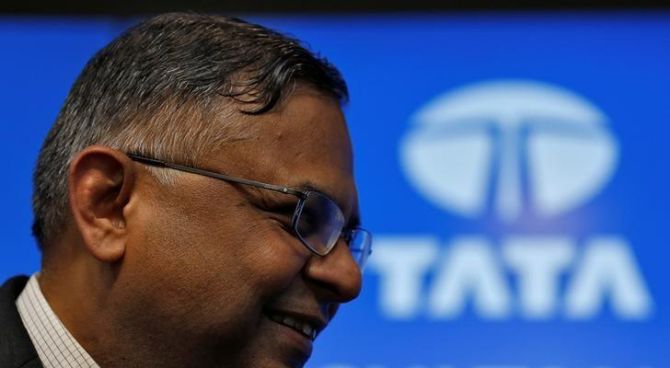 | « Back to article | Print this article |
Chandrasekaran, who is the co-recipient of this year's USIBC Global Corporate Leadership Award, also said it is possible to have a limited deal between India and the US before the elections there in November if both sides work together to get something done and not try to solve all issues at once.

The global supply chain is getting redesigned and redefined in the wake of coronavirus pandemic, current geopolitical situation and trade issues, Tata Group Chairman N Chandrasekaran said on Wednesday.
Speaking in a discussion at the India Ideas Summit organised by the US-India Business Council (USIBC), Chandrasekaran, who is also the co-chair of the US-India CEO Forum, said India can be a very important partner for the US and the companies there, and play a significant role in their supply chain.
Chandrasekaran, who is the co-recipient of this year's USIBC Global Corporate Leadership Award, also said it is possible to have a limited deal between India and the US before the elections there in November if both sides work together to get something done and not try to solve all issues at once.
Without naming China, he said, "...the global supply chain is getting redesigned, redefined because supply has always been created for efficiency.
“Now the recent incidents, the pandemic, the geopolitical situation and trade issues have stressed the importance of having a supply chain that is rebalanced, resilient and not only efficient."
While India and China recently had violent clashes at the border in Ladakh, the US has been having a trade war with China. On the other hand, the coronavirus pandemic originated from Wuhan in China.
Sharing the outcome of the fifth meeting of India US CEO Forum, Chandrasekaran said the Indian side stressed on the fact that "India can be a very important partner for the US, companies in the US, to play a significant role in the supply chain".
"So we have got to work on policies, work on all the aspects that go with it," he added.
Commenting on the Indo-US trade deal, which has been in the works for sometime, Chandrasekaran said industry leaders from both sides "agreed that we have got to conclude the current discussions with a limited trade deal" and start working on a pruned version, so that an FTA (free trade agreement) could be done in the coming years.
He also said it is possible to have a limited trade deal between the two countries "if both sides work together because we are talking about getting something done, rather fall forward and not trying to solve all issues."
Chandrasekaran also asserted that "we will never have a situation where there are no pending issues. When two countries at this level operate, there will always be issues."
It is important to recognise that "US is a very very large economy and India is becoming a very sizable economy with huge potential" and something "really very special" can be achieved if the aspirations of the two nations are put together, he added.
If India and the US help each other and are able to work on supply chain, very high quality jobs can be created in sectors like electronics, advanced manufacturing, medical devices and telecom, thereby creating ecosystems, Chandrasekaran added.
"These ecosystems will spur a lot of innovation, a lot of small scale industries and a lot of direct and indirect jobs," he said.
Saying that "the potential is very high if we start looking at what is possible, what is out of possible, without getting stuck on one particular issue", he added, "there will always be one issue or the other which will always boil and we need to address that, but that should not stop us from aspiring to create something special".
Chandrasekaran also said India has a very large human capital with a lot of skilled manpower and it would like "a free access to the services market in the US because of the expertise that we can bring".